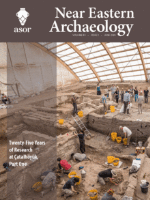
NEAR EASTERN ARCHAEOLOGY
Scope & Guideline
Exploring the Rich Tapestry of Near Eastern Heritage
Introduction
Aims and Scopes
- Archaeological Excavations and Discoveries:
The journal emphasizes original research stemming from archaeological excavations across the Near East, showcasing new findings that enhance our understanding of ancient societies. - Cultural Interactions and Societal Development:
A focus on the interplay between different cultures in the Near East, particularly the development of complex societies, trade networks, and cultural exchanges throughout history. - Environmental Archaeology:
Research addressing the relationship between ancient human populations and their environments, including studies on climate impacts, fauna, and agricultural practices. - Material Culture Studies:
Exploration of artifacts, including pottery, seals, and tools, to understand social structures, economic conditions, and cultural practices of ancient peoples. - Gender Studies in Archaeology:
Investigations into the roles of gender in ancient societies, as evidenced through artifacts and burial practices, contributing to broader discussions on social stratification. - Interdisciplinary Approaches:
The journal encourages methodologies that integrate archaeology with other disciplines such as history, anthropology, and digital humanities, fostering innovative research perspectives.
Trending and Emerging
- Human-Animal Interactions:
Increasing research on the ecological and cultural significance of human-animal relationships in ancient societies, reflecting broader concerns about environmental and ecological studies. - Climate Change and Archaeology:
A growing emphasis on how climate change has impacted past societies, including studies on resilience and adaptation strategies in response to environmental shifts. - Digital Archaeology and Visualization Techniques:
The incorporation of digital tools and methodologies for analysis and presentation of archaeological data, which enhances accessibility and engagement with broader audiences. - Social Identity and Gender Dynamics:
A rising focus on understanding social identity, including gender roles and expressions in ancient cultures, contributing to a more nuanced view of societal structures. - Cultural Heritage and Preservation:
An increasing attention to the importance of preserving archaeological sites and artifacts, particularly in light of modern threats such as conflict, development, and climate change. - Interdisciplinary Collaborations:
Enhanced collaborations across disciplines, integrating insights from anthropology, history, and environmental science to provide a more holistic view of ancient Near Eastern societies.
Declining or Waning
- Traditional Biblical Archaeology:
There appears to be a waning interest in purely biblical archaeology that focuses solely on scriptural narratives without integrating broader archaeological contexts or interdisciplinary approaches. - Static Interpretations of Artifacts:
Research that relies on static or uncritical interpretations of artifacts, without considering evolving methodologies or contemporary theoretical frameworks, is becoming less common. - Narrow Geographic Focus:
There has been a decline in studies that concentrate excessively on specific, often well-trodden sites, instead of exploring a wider range of lesser-known locations in the Near East. - Conventional Excavation Reports:
The journal has shifted away from publishing conventional excavation reports that lack comprehensive analysis and broader implications, favoring studies that provide deeper insights and contextualization.
Similar Journals
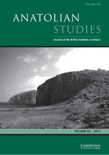
Anatolian Studies
Illuminating the Richness of Anatolian HistoryAnatolian Studies, published by Cambridge University Press, stands as a premier forum for research in the fields of archaeology, cultural studies, and history. Established in 1951, this esteemed journal has consistently contributed to the academic discourse surrounding the rich and multifaceted history of Anatolia, earning its place in the Q1 category across multiple disciplines. With a notable impact factor reflected in its Scopus rankings, it ranks among the top journals in its fields: 78th in History, 155th in Cultural Studies, and 55th in Archaeology, showcasing its significant influence and recognition. This journal serves as an invaluable resource for researchers and scholars seeking to delve into the intricacies of Anatolian heritage, providing a platform for innovative research and critical discussion within the academic community. While it currently does not offer open access, Anatolian Studies continues to enrich scholarly resources and advance knowledge within its key areas of focus.
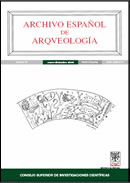
Archivo Espanol de Arqueologia
Connecting scholars to the rich tapestry of history.Archivo Español de Arqueología is a prestigious journal published by the Consejo Superior de Investigaciones Científicas (CSIC), dedicated to the field of archaeology and the historical sciences. Since its transition to Open Access in 1991, this journal has been a significant resource for scholars and practitioners in Spain and beyond, ensuring the dissemination of high-quality research to a broad audience. With an impressive Scopus ranking that places it within the top 20% of journals in the disciplines of History and Archaeology, Archivo Español de Arqueología plays a crucial role in advancing academic discourse and promoting innovative archaeological methodologies. The journal has maintained rigorous standards, reflected in its placement within the Q2 and Q3 quartiles, enabling it to establish a reputation for excellence and reliability in archaeological scholarship. Researchers, professionals, and students are encouraged to explore the journal's diverse array of articles from its foundation year of 2009 to the present, enriching their understanding of the past through the latest findings and theoretical advancements in archaeology.

ARCHAEOLOGY
Pioneering Archaeological Research for Future GenerationsARCHAEOLOGY is a distinguished peer-reviewed journal published by the Archaeological Institute of America, focusing on the multifaceted aspects of archaeological research and its relevance to contemporary society. Established in 1966, this journal serves as a critical platform for scholarly discourse in the field, showcasing innovative findings, theoretical advancements, and methodological discussions related to archaeology. While it maintains a Q4 ranking within the disciplines of archaeology and arts and humanities, its contributions remain valuable for those engaging in archaeological studies or seeking to understand historical and cultural narratives. The journal is accessible in print, with an ISSN of 0003-8113 and an E-ISSN of 1943-5746, ensuring that a wide audience can benefit from its insights. Although currently not classified as Open Access, the meticulous peer-review process ensures a high standard of academic rigor, making it an essential source for researchers, professionals, and students alike who are dedicated to exploring the past through archaeological lenses.

Journal of Pacific Archaeology
Unearthing Insights from the Depths of the PacificThe Journal of Pacific Archaeology, published by the New Zealand Archaeological Association, serves as a pivotal platform for disseminating cutting-edge research in the field of archaeology across the Pacific region. With an ISSN of 1179-4704 and an E-ISSN of 1179-4712, the journal provides a forum for scholarly discourse aimed at both established researchers and emerging scholars alike. Focusing on the rich tapestry of archaeological studies, it covers a diverse array of topics, from ancient settlement patterns and cultural practices to contemporary analyses of material culture. As an Open Access journal, it ensures that its findings are readily available to all, fostering inclusivity in academic research and enabling practitioners to share knowledge without barriers. The Journal of Pacific Archaeology is indispensable for those committed to understanding the complexities and nuances of Pacific archaeology, making significant contributions to both regional and global archaeological narratives.
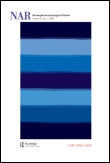
Norwegian Archaeological Review
Diving Deep into Archaeological NarrativesNorwegian Archaeological Review, published by Routledge Journals, Taylor & Francis Ltd, is a leading interdisciplinary journal that has made significant contributions to the field of archaeology since its inception in 1968. With an impressive Q1 ranking in the Arts and Humanities category for archaeology and an 86th percentile ranking in Scopus, this journal serves as a crucial platform for showcasing innovative research that advances our understanding of human history and cultural heritage. The Review provides a diverse range of scholarly articles, critical reviews, and thoughtful discussions, making it an essential resource for researchers, professionals, and students alike. While the journal currently does not offer an open-access option, it continues to maintain high editorial standards and relevance within the academic community, with publication converging up to 2024. The Norwegian Archaeological Review thrives as a nexus for academic discourse, encouraging the exploration of archaeological methodology, theory, and practice against the backdrop of contemporary global challenges.
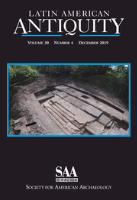
LATIN AMERICAN ANTIQUITY
Unearthing the Rich Tapestry of Latin American HeritageLATIN AMERICAN ANTIQUITY is a prestigious journal published by Cambridge University Press, focusing on the archaeology and history of Latin America. With an impressive impact factor reflecting its critical role in the academic community, this journal exemplifies excellence in research, landing in Q1 across multiple categories, including Archaeology and History, as per the 2023 category quartiles. The journal's scope covers a broad range of topics related to pre-Columbian cultures, ancient civilizations, and historical developments, making it essential reading for researchers, professionals, and students keen on exploring the rich tapestry of Latin American heritage. Although it is not an open-access publication, LATIN AMERICAN ANTIQUITY remains a vital resource for those dedicated to advancing knowledge in this dynamic field. With its commitment to scholarly rigor and a strong ranking in Scopus, it serves as a cornerstone for academic dialogue and investigation.

Spal
Illuminating the Path of Historical Inquiry.Spal is a distinguished academic journal dedicated to the fields of Archaeology and History, published by the University of Seville, Editorial. With an ISSN of 1133-4525 and an E-ISSN of 2255-3924, it has established a prominent reputation within the scholarly community, currently enjoying an impressive Q1 ranking in Archeology (Arts and Humanities) and History, alongside a Q2 ranking in Archeology for 2023. The journal serves as a critical platform for researchers, professionals, and students alike, promoting the dissemination of cutting-edge research and innovative methodologies in these vital disciplines. Spal's Scopus Ranks place it in the 84th percentile for Arts and Humanities - History and the 72nd for Archeology within the field, emphasizing its impact and relevance in contemporary scholarship. Although it operates under a traditional access model, its commitment to advancing knowledge and discourse in archaeological and historical studies remains unwavering. The journal's coverage spans from 2015 to 2024, positioning it well to contribute to ongoing academic conversations and foster collaborations within the global research community.

Bulletin de la Societe Prehistorique Francaise
Illuminating the Pathways of Human HistoryBulletin de la Societe Prehistorique Francaise (ISSN: 0249-7638; E-ISSN: 1760-7361), published by the SOCIETE PREHISTORIQUE FRANCAISE, stands as a pivotal journal within the domain of archaeology, particularly emphasizing prehistoric studies. With its classification in the Q2 quartile of both the arts and humanities as well as social sciences in archaeology, the journal positions itself among the top 25% of publications in these categories as of 2023. This distinguished ranking reflects its significant contribution to the field, providing researchers, professionals, and students with critical insights and innovative methodologies related to prehistoric research. Although open access options are currently unavailable, the journal is committed to fostering academic discourse and sharing knowledge that influences contemporary archaeological practices. As a member of the elite academic community, Bulletin de la Societe Prehistorique Francaise is highly regarded for its rigorous peer-review process and dedication to the advancement of archaeology, making it an essential resource for anyone invested in understanding our historical roots.

Vjesnik Arheoloskog Muzeja u Zagrebu
Illuminating the Past, Inspiring the FutureVjesnik Arheoloskog Muzeja u Zagrebu, published by the ARHEOLOSKI MUZEJ & ZAGREBU, is a vital platform for disseminating scholarly research in the field of archaeology. With its Open Access model established in 2007, the journal ensures that vital archaeological findings and theories are accessible to a global audience, fostering greater collaboration and knowledge-sharing among researchers, professionals, and students. The journal is based in Croatia and has been an essential part of the academic landscape since its inception, with convergence noted in years such as 1979 and 1981, and continuing consistently from 2014 to 2023. While it currently holds a Q4 ranking in both the Arts and Humanities and Archaeology categories, its contributions to the understanding of archaeological heritage in the region are invaluable. Positioned within the 30th percentile among its peers in Scopus rankings, the journal endeavors to elevate the discourse around archaeological practices and findings, making it an important resource for anyone engaged in the pursuit of archaeological knowledge.
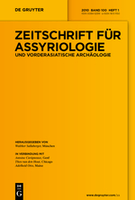
Zeitschrift fur Assyriologie und Vorderasiatische Archaologie
Exploring the Depths of Assyrian HeritageZeitschrift für Assyriologie und Vorderasiatische Archäologie, published by WALTER DE GRUYTER GMBH, is a distinguished journal in the field of archaeology, focusing on the rich histories of the ancient Near East and Assyrian studies. Established in 1886, this journal has a venerable tradition of contributing to scholarly discourse, continuously curating impactful research that positions it within the Q2 quartile in the domains of Archaeology and Arts and Humanities as of 2023. With an impressive ranking of #101 out of 413 in Arts and Humanities and #98 out of 354 in Social Sciences within Scopus, the journal serves as a vital resource for researchers, professionals, and students alike. Although it operates under a subscription model, the journal's extensive coverage—from its inception to the present day—ensures a comprehensive exploration of archaeological methodologies, discoveries, and theoretical frameworks. The journal's aim is to advance the understanding of the ancient civilizations of the Near East and to foster scholarly communication across international platforms, making it an essential venue for contemporary archaeological research.